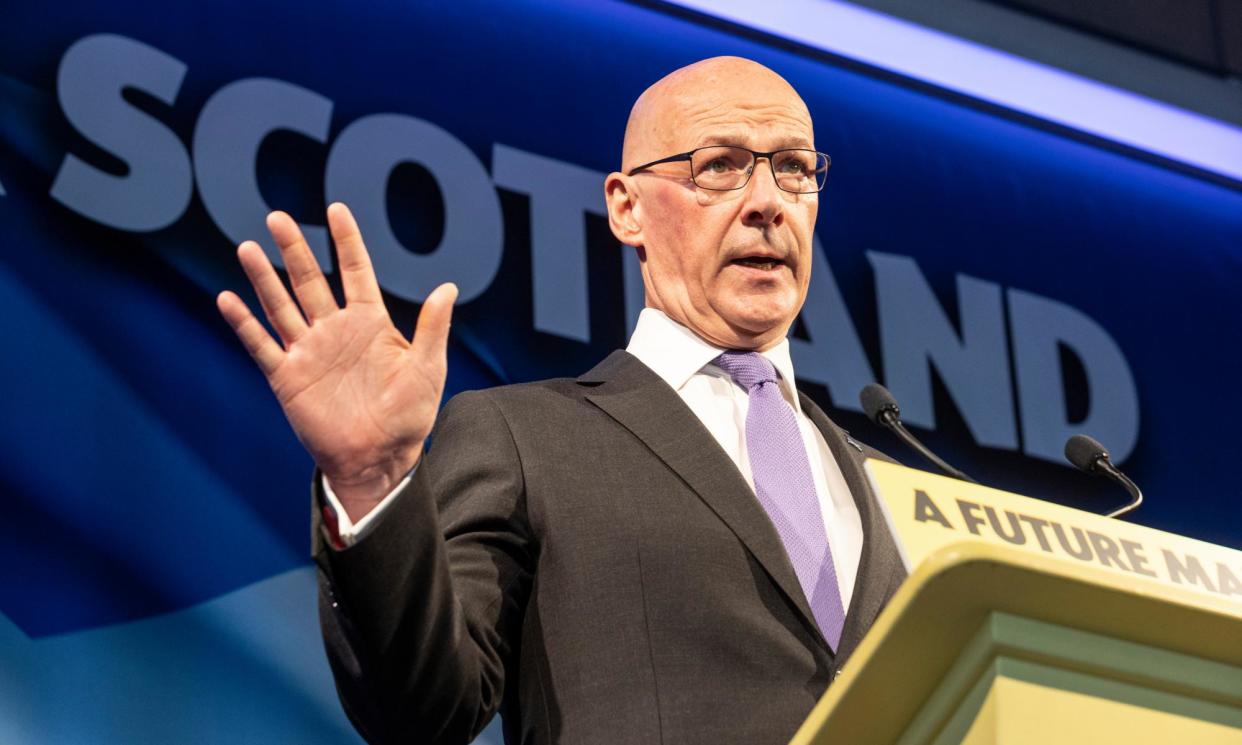Election fight between Labour and SNP is still on, says John Swinney

The election is “over and done with” in England, but in Scotland the contest between Labour and the SNP is still on, says John Swinney.
The SNP leader, a respected party veteran who stepped into the role barely two weeks before the election was called, acknowledged that the framing of the campaign around Labour’s drive to kick the Tories out of Downing Street had made it “a challenge” for the nationalists to push their own agenda.
But he insisted that a recent narrowing of the gap between Labour and SNP indicated that his argument that “Labour is going to pick up where the Tories are leaving off” was landing with voters.
“The election is essentially over and done with in England, but there’s still a contest on in Scotland. Labour are beating the Tories in England two to one – here we are broadly level.” Polling for Savanta on Thursday found the parties level on 34 points, although Survation on the same day found Labour six points ahead on 37.
“I understand why people want to get rid of the Tories,” Swinney says. “But people are seeing through the Labour party. Think about what it means that next Friday Tory austerity will be Labour austerity.”
Attacks on Labour’s spending plans have been a dominant theme of the SNP’s campaign, alongside the need for a cohort of SNP MPs to push the new government towards more radical decisions, for example ending the two-child cap and introducing an essentials guarantee.
But these have been undermined by growing discontent at the SNP’s record on public services at Holyrood while Labour, which had only two Scottish MPs compared with the SNP’s 43 in the last parliament, is enjoying a reversal of fortune as independence supporters are increasingly attracted to Starmer’s message of change.
Related: Sign up for Election Edition, our UK general election 2024 newsletter
Scotland’s first minister acknowledged that the party has had “a tough time” – referring to the turmoil that followed the resignation of Nicola Sturgeon in spring 2023, with the embezzlement charges brought against her husband, the party’s former chief executive Peter Murrell, vicious infighting over the governing partnership with the Scottish Greens, which ultimately brought down Sturgeon’s successor, Humza Yousaf, and the resignation of the Holyrood health secretary, Michael Matheson, over his astronomical parliamentary iPad bill.
“But I’ve already accomplished objective one in my short leadership with the SNP which was to bring unity to the party,” says Swinney. After a year of public grievance-airing, it is notable how much more disciplined the party has been in recent weeks, despite facing their most serious electoral threat since 2007.
“We’ve been underpinned by that unity during this election campaign, and I think it’s given the party a reminder that if we are united we’ll perform much better”.
One of the main themes of this election is how disaffected voters are with all politics – given that recent turmoil, does the SNP share some of the responsibility for that erosion of trust?
“We’ve got to recognise the need to build trust with the electorate,” he says, emphasising that “it was never taken for granted”.
Swinney has represented his rural Perthshire North constituency for decades. He was a trusted enforcer of Sturgeon’s progressive agenda, and brought Kate Forbes, a social conservative who nearly beat Yousaf to the party leadership, back into cabinet and argued his party put forward the most leftwing manifesto of the campaign. So who does the SNP represent now?
The party occupies “a moderate left of centre position”, he says. “I’ve always believed that you will only ever be successful if you’re in the mainstream of politics.”
That includes increasing tax for higher earners, he says – a policy attacked from left and right but which he contrasts with Labour’s pledge not to do so. “I believe in progressive taxation. You take decisions that you can rationally express to the public about what impact they have on the wider community within Scotland.”
The SNP manifesto foregrounded the party’s core commitment to independence, after criticism that his party had downplayed it earlier in the campaign.
Does it concern him that this has pulled discussion back to the mechanics of referendum strategy, when SNP MPs have been telling the Guardian for months that voters are telling them to focus on their cost of living concerns?
“I’m talking a single bit about process,” says Swinney. “I’m saying Scotland has got an austerity problem, a Brexit problem, and a cost of living problem. And I’m saying the answer to that is independence, because these decisions all come from Westminster”.
Guardian Newsroom: Election results special. On Friday 5 July, 7.30pm-9pm BST, join Hugh Muir, Gaby Hinsliff, John Crace, Jonathan Freedland and Zoe Williams for unrivalled analysis of the general election results.Book tickets here or at theguardian.live

 Yahoo News
Yahoo News 
